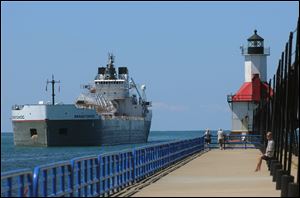
Lake Michigan down 11 inches in year, hurting businesses
Waterfront property owners, boat operators lose money
9/3/2012
The 630-foot, 19,650-ton barge Manitowoc, operated by the Lower Lakes Transportation Company, passes the St. Joseph Lighthouse as it leaves Lake Michigan and enters the St. Joseph River last month in St. Joseph, Mich. As the drought contributes to a continued drop in the level of Lake Michigan, residents, fishing operators and others who use the harbors and docks in the northwestern Lower Peninsula are facing hazards and hassles.
LELAND, Mich. — As the drought contributes to a continued drop in the level of Lake Michigan, residents, fishing operators and others who use the harbors and docks in the northwestern Lower Peninsula are facing hazards and hassles.
The lake's water levels are down 11 inches from 2011, and record low levels could be ahead if the drought persists.
Those affected by the dropping water levels include lakefront property owners on Grand Traverse Bay, as well as commercial fishing operators such as Joel Peterson, who fishes out of Leland and Muskegon. Leland Harbor's south breakwall is deteriorating, and boaters must avoid hitting bottom on the Leland River, said Peterson.
"It means we can't carry as much on the boat anymore," Petersen told the Traverse City Record-Eagle (http://bit.ly/Ra6XXb ). "We often carry four nets, and when they are wet, they are heavy. Now we can only carry two, so it takes us twice as long and costs more money."
The drought has caused problems for farmers as well, leading to a federal disaster declaration for the entire state. The same weather patterns are affecting the Great Lakes' levels, officials say.
"Typically water levels drop in the fall and winter and go up in the spring, but we didn't see much of a rise this spring," said Craig Stow, a researcher at the National Oceanic Atmospheric Administration's Great Lakes Environmental Research Lab in Ann Arbor. "It's always a balance between evaporation and precipitation, and when the water is warm, you get a lot of evaporation."
Lake Michigan now is 23 inches below the long-term average, said Mark Breederland, an extension educator for the Michigan Sea Grant. And lakes Michigan and Huron are in the midst of a decade-long stretch of below-average water levels, said hydrologist Keith Kompoltowicz at the U.S. Army Corps of Engineers' Detroit District.
The corps has forecasted water-level ranges for Lake Michigan that may possibly break the record low, set in 1964.
"The Great Lakes are dynamic, living ecosystems that change from one day to the next," said Jennifer McKay, a policy specialist at the Tip of the Mitt Watershed Council in Petoskey. She said that low water levels in Lake Michigan "have been a concern for many years to many different entities."